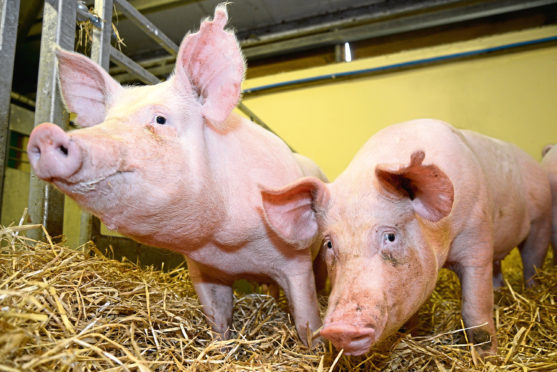Scottish scientists have developed pigs resistant to one of the industry’s most costly diseases.
Researchers at the Roslin Institute in Edinburgh teamed up with animal genetics company Genus PLC to produce pigs resistant to Porcine Reproductive and Respiratory Syndrome (PRRS).
The disease is estimated to cost the pig industry around £1.75 billion in lost revenue in Europe and the US every year.
It causes breathing problems and deaths in young animals, and if pregnant sows become infected they can lose their litter.
The virus infects pigs using a receptor on their cells’ surface called CD163.
Scientists used gene editing techniques to remove a small section of the gene, focusing on the section the virus attaches to and leaving the rest of the molecule intact.
Previous trials had shown the cells from the animals were resistant to the virus in lab tests, and researchers have now exposed pigs to the virus to see if they become infected.
In the trials none of the animals became ill and blood tests found no trace of the infection.
Dr Christine Tait-Burkard, of the Roslin Institute, said: “These results are exciting but it will still likely be several years before we’re eating bacon sandwiches from PRRS-resistant pigs.
“First and foremost we need broader public discussion on the acceptability of gene-edited meat entering our food chain, to help inform political leaders on how these techniques should be regulated.
“We also need to carry out longer-term studies to confirm that these genetic changes do not have any unforeseen adverse effects on the animals.
“If these studies are successful and the public are accepting of this technology, we would then be looking to work with pig breeding companies to integrate these gene edits into commercial breeding stocks.”
Genetically modified (GM) animals are currently banned from the food chain in Europe and it is not clear what regulations would apply to gene-edited animals, as the approach is different.
Researchers say while GM techniques have been controversial because they can involve introducing genes of other species into an animals, gene editing is different because it speeds up processes that could occur naturally through breeding over many generations.
Genus PLC’s chief scientific officer, Jonathan Lightner, said: “These results are very exciting and further underscore the potential, through gene editing, to provide incredible benefits to the global pork industry, and society as a whole, by improving animal health.
“We look forward to further collaboration with the University on this exciting project.”
The research was a result of a long-term investment from the Biotechnology and Biological Sciences Research Council.
The findings were published in the Journal of Virology.
